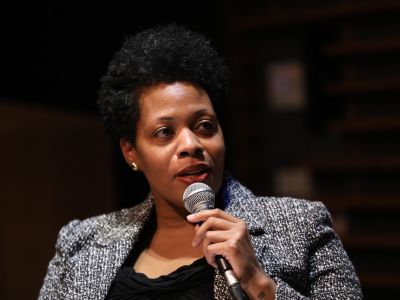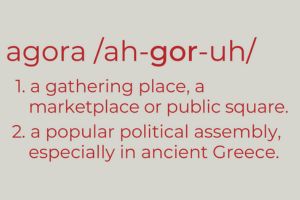No Progress Without Struggle
Director of Engagement Kamilah Rashied assesses the role of power in The Lion in Winter and our postpandemic lives, setting the stage for the upcoming production of Antigone and this season’s Engagement programming. Learn what Court’s Engagement department is dreaming up, why it’s relevant, how it connects to the 2023/24 season, and how you can participate.
Following the distancing period of the pandemic and a national uprising that forced us to reckon with our unjust past and present, we now find ourselves back to a not-so-normal proximity. After several years in isolation, we have a new and unavoidable closeness with who we really are. A closeness that exposed revelations about how our actions impact the wellbeing of both our neighbors and our nation. Coming together means something different now, even if we’re still trying to decipher its meaning.

As we open our season with a play about a dysfunctional family squabbling for power, I can’t help but notice the parallels between this plot and the present moment. There is discord everywhere and a palpable feeling of overwhelm as we try to make sense of it all, both on the stage and off. The reality remains: post-pandemic, we did not return to the world we knew before. We did not return to the stage as we knew it, either. What does that mean for Court Theatre at a time when so many theaters, including our own, are in a space of tumultuous change? How do we chart a course forward in the midst of our own seismic succession?
We get to work dreaming. We tap into the radical imagination to discover new possibilities for our future. Frederick Douglass famously said, “If there is no struggle, there is no progress.” Wise counsel from one of the most visionary thinkers in American history. This clarion call invites us to roll up our sleeves, despite the uncertainty, to build the world we want and restore the things we believe are worth keeping. I remain encouraged as we at Court Theatre continue to test what our storytelling can be and do in this moment.
As I embark on our first season of Engagement programs in earnest, I do so mindful of these shifting paradigms—in our world, in our industry, and at our very own theater. How we hold, build, and share power is a seminal theme throughout the season and a constant consideration for me personally. I ask myself daily, How do we include more voices in our creative process? How do we foster the making of meaning, together, with the community? I think the best way to approach big questions like these is the same way ambitious thinkers always have: through a forum for meaningful dialogue.

In that vein, we’ll be launching a few programs this year, beginning with the Agora Conversations, to connect the ideas on our stage with current civic and social events.
Agora Conversations invite thinkers, creatives, and activists to share bold ideas that shed light on the lived experiences of Chicagoans today.
I hope you will join us at the Agora Conversations—and other upcoming programs—to participate in our collective dreaming.
Agora Conversations
Systems of oppression configure our daily lives through an omnipresent, inconspicuous architecture. When we pause to interrogate the design of our world, we inevitably find incongruencies between who has power and who does not, who has mobility and who is restricted. The central crisis at the heart of Antigone’s plot is the heroine’s choice to openly perform a defiant act of love, which in turn, challenges the legitimacy of an entire empire.

In this inaugural Agora Conversation, we will be in dialogue with civic thinkers and activists whose advocacy initiates a kind of hypervisibility—a real-world theater of refusal—that centers histories and lived experiences that have been pushed to the margins and suppressed.
This program will take place on Monday, February 12 at Experimental Station. Founded in 2002 on the South Side of Chicago, Experimental Station provides essential resources that respond to local needs.
More information about this event—and future Engagement programming and events—will be available soon; sign up for our email newsletter, follow our social media channels, and check our website for regular updates. We can’t wait to share what we’ve been working on.
Kamilah Rashied is the Director of Engagement at Court Theatre. Rashied is an arts administrator, producer, educator, and artist with 20 years of experience in cultural production, education, and community outreach. Cultivating a broad range of programs for the public, Rashied has contributed to the development of new and ongoing programs at venerable arts and culture organizations across Chicago.